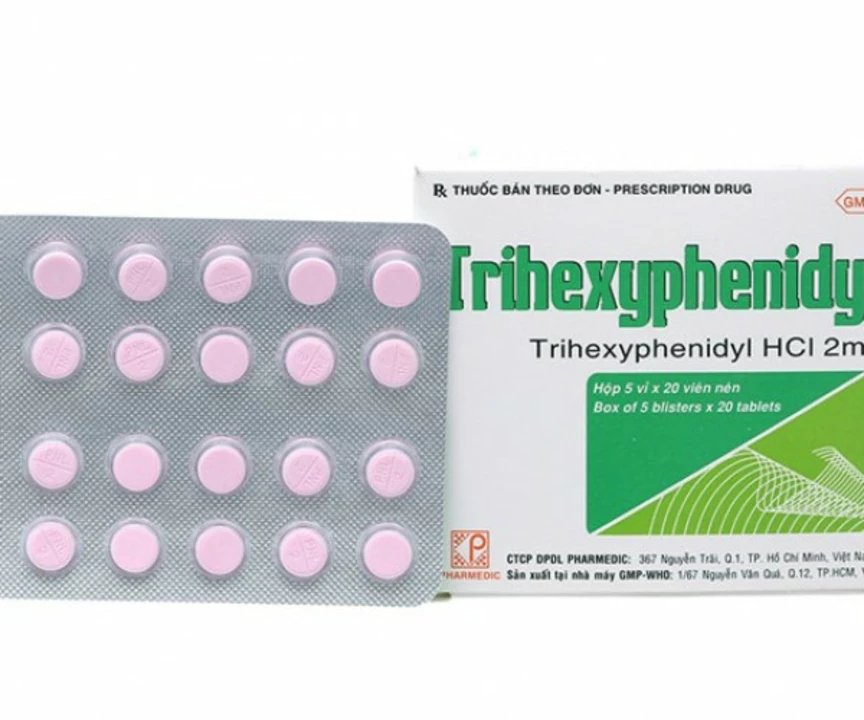Trihexyphenidyl (brand name Artane) is an anticholinergic medicine used to treat Parkinson’s symptoms and drug-induced movement problems.
It helps reduce tremor, muscle stiffness, and drooling by blocking acetylcholine signals in the brain. Doctors often pick it when tremor is a dominant issue or when antipsychotic medications cause extrapyramidal symptoms (EPS).
How it's used and dosed
For adults, doctors typically start low and increase slowly. A common approach is 1 mg once or twice daily, moving up by 1–2 mg every few days until symptoms improve. Effective daily doses often fall between 2 mg and 10 mg, though some people may need more; follow your prescriber’s plan. For acute drug-induced dystonia, a single dose may work quickly. Children and older adults need special dosing and close monitoring.
What to watch for — side effects and risks
Expect anticholinergic side effects: dry mouth, blurred vision, constipation, trouble peeing, faster heartbeat, and feeling drowsy or confused. Older adults are at higher risk for confusion, memory issues, and falls. If you notice sudden confusion, hallucinations, or severe difficulty urinating, contact a clinician right away. Long-term use can worsen cognitive problems for people with dementia.
Interactions and contraindications
Trihexyphenidyl adds to the total anticholinergic load. Avoid combining it with other strong anticholinergics (like some antihistamines, tricyclic antidepressants, or bladder antimuscarinics) when possible. Don’t use it if you have untreated narrow-angle glaucoma, severe urinary retention, or myasthenia gravis. Be cautious with alcohol and sedatives — they increase drowsiness.
Practical tips for taking it
Take doses with water and try to stick to the same times each day. If it causes daytime drowsiness, ask about taking the largest dose at night. Chewing sugar-free gum or sipping water can help dry mouth. Maintain fiber and fluids to prevent constipation. Carry a pill card that lists anticholinergic medications in case of emergency.
When to call your doctor
Call for high fever with hot, dry skin, severe confusion, fast heartbeat, fainting, or trouble breathing — these can be signs of anticholinergic toxicity. Also report trouble urinating or severe constipation. If symptoms don’t improve after a planned dose increase, check back in; a different treatment may work better.
Final note
Trihexyphenidyl can be very helpful for tremor and some drug-related movement issues, but it’s not ideal for everyone. If you’re older or have memory problems, discuss safer alternatives with your clinician. Keep a simple symptom log for a couple of weeks so you and your provider can see what’s working and what isn’t.
Monitoring and follow-up: after starting trihexyphenidyl, expect a follow-up within 2–4 weeks to check symptom control and side effects. Bring a list of all meds, including OTC and herbal remedies, so your clinician can spot interaction risks. If you stop the drug, taper under medical advice — abrupt stop can bring return of symptoms. For people with Parkinson’s, trihexyphenidyl often pairs with levodopa when tremor stays troublesome. For antipsychotic-induced EPS, sometimes lowering the antipsychotic dose or switching medications is a safer long-term fix. Ask about non-drug options like physical therapy and occupational therapy too.

Trihexyphenidyl and Travel: Tips for Managing Symptoms on the Go
Traveling can be quite challenging for individuals taking Trihexyphenidyl, especially when it comes to managing symptoms on the go. First off, it's essential to have a pill organizer to ensure you're taking the medication on time and not missing any doses. Secondly, keeping a journal to track your symptoms and medication intake can help you identify any patterns or triggers. It's also vital to stay hydrated and maintain a healthy diet while traveling, as this can help alleviate some side effects. Lastly, don't hesitate to inform your travel companions about your condition, so they can provide support if needed.
- Drug Information (69)
- Health and Wellness (59)
- Medical Conditions (22)
- Pharmacy Information (22)
- Supplements (4)
- Diabetes (4)
- Travel Health (3)
- Mental Health (3)
- Heart Health (2)
- Parenting (2)
-
Statins and ALS: What the Latest Science Really Says
23 Nov 2025 -
Supply Chain Problems: Distribution Risks for Generic Drugs
7 Feb 2026 -
Top 10 Drug Information Platform Alternatives in 2024
31 Oct 2024 -
Exploring Cutting-Edge Alternatives to Propecia in 2025
31 Jan 2025 -
Magnesium Hydroxide: Chemical Properties, Solubility, Ksp, and Reactions
28 Aug 2025

14.05.23
Alistair Mukondiwa
13